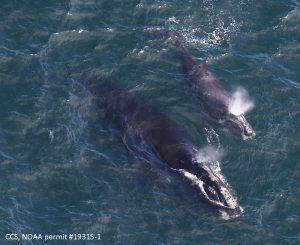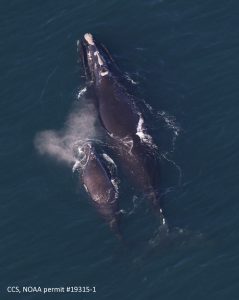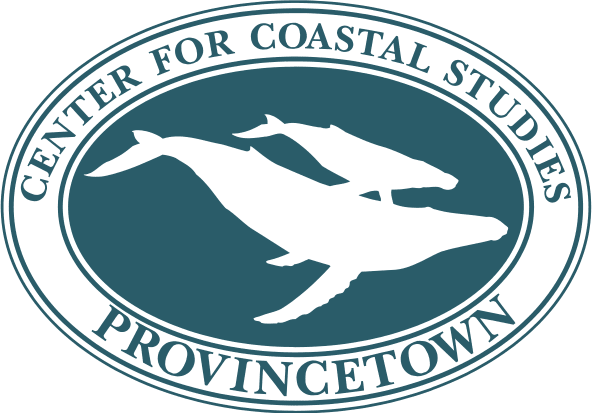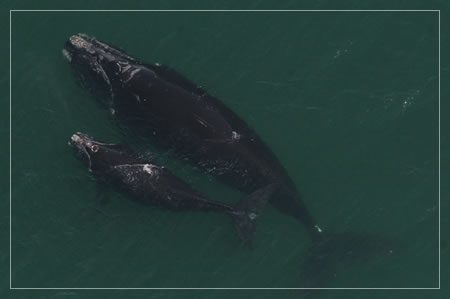
EgNo 4180 and her 2019 calf photographed by the CCS aerial survey team in Cape Cod Bay on 4/11/19. CCS image, NOAA permit # 19315-1.
On Thursday, April 11 the Center for Coastal Studies right whale aerial survey team spotted two more mom/calf pairs in Cape Cod Bay, bringing the number of calves observed off Cape Cod this season to three. The mothers have been identified as EgNo 4180 and EgNo 3317.
EgNo 4180 and her calf were sighted in the southern portion of the bay. EgNo 4180 was first seen by CCS in 2010, making her at least 9 years old, and she has been seen every year since then with the exception of 2015. The last time she was seen was in late April 2018; although researchers were unaware that she was pregnant. Unfortunately at some point between then and summer 2018 she encountered gear and was seen with new entanglement wounds on her peduncle and back.
EgNo 4810 was first seen with her calf by a Florida park ranger from shore in February. Prior to this sighting her sex was unknown, so now researches have confirmation that she is female.

EgNo 3317 and her 2019 calf photographed by the CCS aerial survey team in Cape Cod Bay on 4/11/19. CCS image, NOAA permit # 19315-1.
EgNo 3117 and her calf in the middle part of the bay. EgNo 3317 was born in late 2002 to EgNo 1817 (Silt), who was also sighted in Cape Cod Bay this season. Silt brought EgNo 3317 into Cape Cod Bay when she was a calf in 2003, but observers didn’t see her in the bay again until 2016, which happens to be the last time she had a calf. EgNo 3117’s first calf, EgNo 3917, was born in 2009, and has been observed here nearly annually since 2011.
In 2017 CCS researchers documented EgNo 3317 outside of Cape Cod Bay, and last year (when she was pregnant) she was seen inside the bay between February and March. She was the second mom documented this season, and was first documented with her calf from a shore sighting in January.
Boaters, kayakers, paddle-boarders, swimmers and light aircraft and drone pilots are reminded that it is illegal to approach a North Atlantic right within 500 yards (1500 feet) without a Federal Research Permit. However, the right whales often feed very close to shore, offering whale watchers on land unbeatable views of one of the rarest of the marine mammals.
CCS right whale research and response operations are conducted in partnership with DMF and NOAA under federal permits issued by the National Marine Fisheries Service. Support also comes from the Massachusetts Environmental Trust and contributions from private foundations and CCS members.


